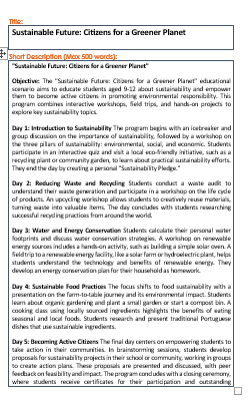Objective: The “Sustainable Future: Citizens for a Greener Planet” educational scenario aims to educate students aged 9-12 about sustainability and empower them to become active citizens in promoting environmental responsibility. This program combines interactive workshops, field trips, and hands-on projects to explore key sustainability topics.
Day 1: Introduction to Sustainability The program begins with an icebreaker and group discussion on the importance of sustainability, followed by a workshop on the three pillars of sustainability: environmental, social, and economic. Students participate in an interactive quiz and visit a local eco-friendly initiative, such as a recycling plant or community garden, to learn about practical sustainability efforts. They end the day by creating a personal “Sustainability Pledge.”
Day 2: Reducing Waste and Recycling Students conduct a waste audit to understand their waste generation and participate in a workshop on the life cycle of products. An upcycling workshop allows students to creatively reuse materials, turning waste into valuable items. The day concludes with students researching successful recycling practices from around the world.
Day 3: Water and Energy Conservation Students calculate their personal water footprints and discuss water conservation strategies. A workshop on renewable energy sources includes a hands-on activity, such as building a simple solar oven. A field trip to a renewable energy facility, like a solar farm or hydroelectric plant, helps students understand the technology and benefits of renewable energy. They develop an energy conservation plan for their household as homework.
Day 4: Sustainable Food Practices The focus shifts to food sustainability with a presentation on the farm-to-table journey and its environmental impact. Students learn about organic gardening and plant a small garden or start a compost bin. A cooking class using locally sourced ingredients highlights the benefits of eating seasonal and local foods. Students research and present traditional Portuguese dishes that use sustainable ingredients.
Day 5: Becoming Active Citizens The final day centers on empowering students to take action in their communities. In brainstorming sessions, students develop proposals for sustainability projects in their school or community, working in groups to create action plans. These proposals are presented and discussed, with peer feedback on feasibility and impact. The program concludes with a closing ceremony, where students receive certificates for their participation and outstanding contributions, reflecting on the week’s activities and the importance of sustainability citizenship.


